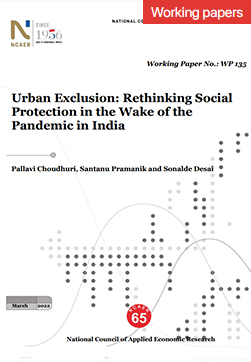
The COVID-19 pandemic, and the consequent nationwide lockdown in India that began on March 25, 2020, caused a major disruption in the labour market, leading to the widespread loss of livelihoods and food insecurity. The findings from a telephonic survey of a representative sample of more than 3,000 households in the National Capital Region (NCR) also reveal a dramatic loss in earning capacity. The place of residence and occupation mediated the impact of the lockdown, with greater vulnerabilities witnessed amongst those engaged in informal employment, especially in urban areas. The Government rolled out a series of welfare measures in response to the widespread economic distress, with the provision of free foodgrains and cash transfers aimed at rehabilitating those who were the most affected. While the use of prior social registries enabled quick disbursement, our analysis points to the presence of unmet need, with such exclusion being exacerbated in the urban areas. The findings also reveal that the likelihood of receiving benefits increases with improvements in targeting at the local level and is vital for building social registries.